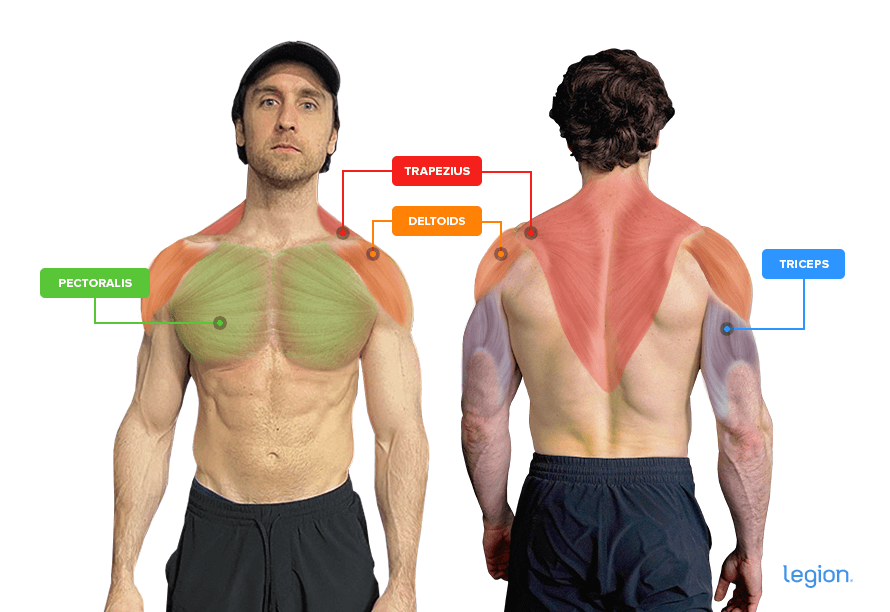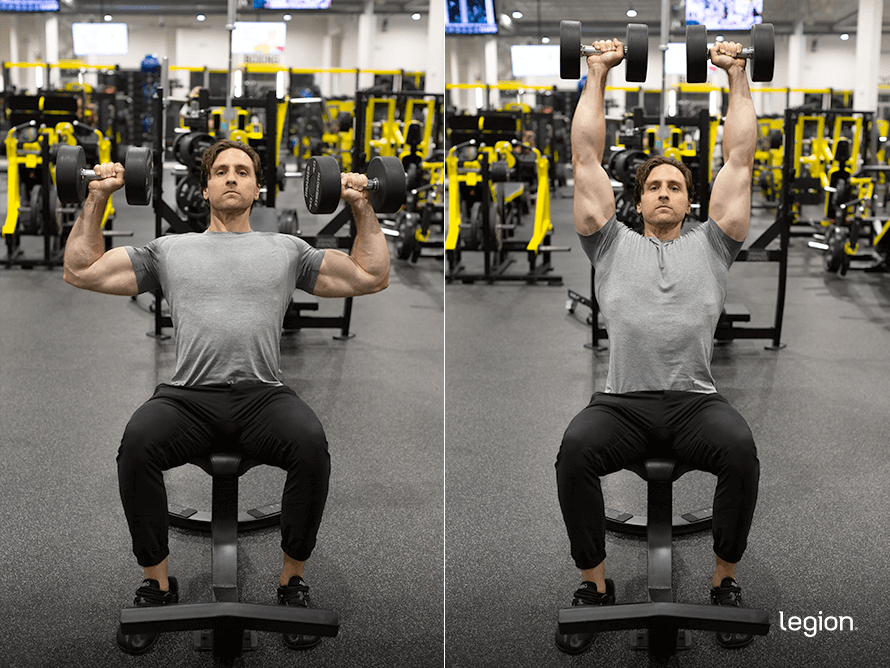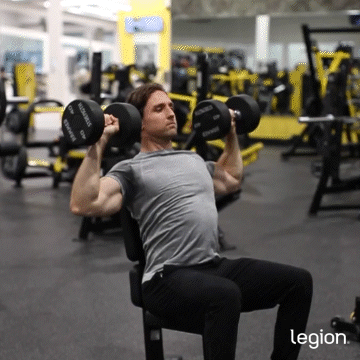The dumbbell shoulder press is an excellent exercise for developing strong, symmetrical shoulders.
It’s particularly effective for training the front and side deltoids, which are most responsible for the size and shape of your shoulders. It’s also safe, easy to learn, and requires minimal equipment.
In this article, you’ll learn what the dumbbell shoulder press is, how to perform proper shoulder press form, the most common mistakes and how to fix them, the best variations and alternatives, and more.
What Is the Dumbbell Shoulder Press?
The dumbbell shoulder press is an upper-body exercise that primarily trains the deltoids (shoulder muscles) and triceps.
Similarly to the overhead and military press, it involves pressing weights from shoulder height overhead, then lowering them to shoulder height again. The difference is that you perform the shoulder press with dumbbells rather than a barbell.
There are two versions of the shoulder press with dumbbells: the seated shoulder press and the standing shoulder press.
While some evidence shows the standing version activates your shoulder muscles slightly more than the seated dumbbell press, I recommend doing the seated version because it lets you lift heavier weights, which likely offsets any benefit of higher muscle activation.
The seated shoulder press is also easier to learn, set up, and perform.
Dumbbell Shoulder Press: Muscles Worked
The main muscles worked by the dumbbell shoulder press are the . . .
- Deltoids
- Triceps
- Pectoralis major and minor
- Trapezius (traps)
It also trains the abs, biceps, forearms, serratus anterior, and rotator cuff muscles to a lesser degree.
Here’s how the main muscles involved look on your body:

How to Do the Seated Dumbbell Shoulder Press
The best way to learn proper seated dumbbell shoulder press form is to split the exercise into three phases: set up, press, and descend.

1. Set Up
While sitting on an upright bench, hold a dumbbell in each hand and rest them on your thighs. Nudge the dumbbells with your thighs and hoist them just above your shoulders with your palms facing away from you.
Press your mid and upper back against the backrest, push your chest out, and pull your shoulder blades down and together.
2. Press
Press the dumbbells toward the ceiling until your elbows are almost locked, allowing the dumbbells to drift toward each other as your elbows straighten.
Keep your mid and upper back pressed into the backrest, and avoid excessively arching your lower back or letting your butt scoot forward on the bench.
3. Descend
Reverse the movement and return to the starting position.
Here’s how proper shoulder press form should look when you put it all together:

Seated Dumbbell Shoulder Press Form: Common Mistakes
1. Pressing one arm higher than the other.
The problem: Because most people are stronger on one side of their body than the other, many struggle to press the dumbbells symmetrically.
The fix: Choose dumbbells that are light enough to complete full reps with your weaker side. They may feel too light for your stronger side, but over time, your weaker side will catch up to your stronger side so that you can straighten both arms equally.
2. Slamming the dumbbells together.
The problem: As you press the dumbbells, you allow the dumbbells to slam together at the top of each rep, making the exercise more difficult to control.
The fix: Imagine “throwing the dumbbells into the ceiling.” This helps you lift more weight and focus on pressing the dumbbells straight up, preventing them from smacking into one another.
3. Not using a full range of motion.
The problem: As you progress to heavier weights, you cheat by shortening the range of motion—only lowering the dumbbells to about eye level. While this makes it easier to press heavier weights, it also makes the exercise less effective.
The fix: Use weights that allow you to complete full reps before progressing. Give your body time to grow bigger and stronger, and don’t rush the process by compromising your technique.
Seated Dumbbell Shoulder Press Variations and Alternatives
1. Arnold Shoulder Press
Because of the way you rotate your wrists in the Arnold press, you train your side delts slightly more than with other overhead pressing shoulder exercises, helping you develop proportional shoulders.
2. Seated Barbell Shoulder Press
Using a barbell instead of dumbbells for the seated shoulder press enables most people to press about 10-to-20% more weight and progress to heavier weights faster, which is great for building muscle and strength. The downsides are that it has a shorter range of motion than the seated shoulder press with dumbbells and doesn’t help you find and fix muscle imbalances.
3. Standing Barbell Shoulder Press
In addition to improving upper-body strength and shoulder, trap, triceps, and upper chest size, the barbell overhead press develops your whole-body balance and coordination.
4. Machine Shoulder Press
Generally speaking, machines aren’t as effective as free weights. However, the machine shoulder press can be useful if you’re working around an injury or are new to weightlifting.
5. Landmine Shoulder Press
The landmine shoulder press trains just one side of your body at a time, so it’s useful for identifying and correcting strength and muscle imbalances. The diagonal pressing path also makes it more comfortable for those with shoulder issues.










